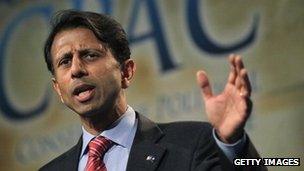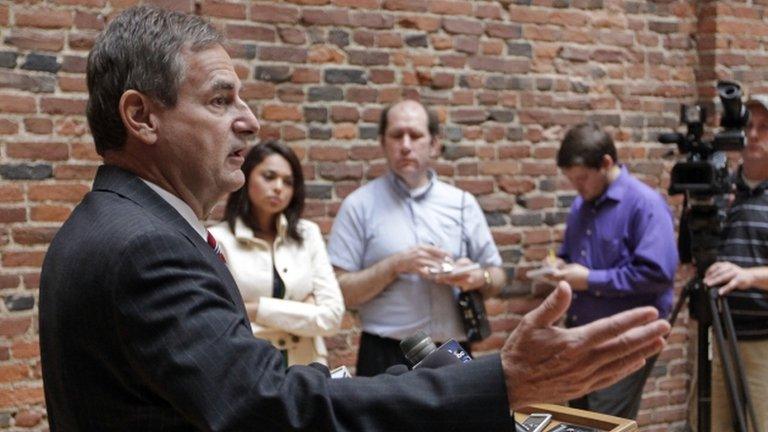Are Republicans the 'stupid party'?
- Published
- comments

Jindal's critique: Avoid 'sideshows' but don't change principles
Bobby Jindal is warning that the Republicans must stop being the "stupid party", external.
The Louisiana governor, a likely contender for his party's presidential nomination in 2016, said a number of Republicans had "damaged the brand" by making "offensive and bizarre" comments.
He's talking of course about those remarks about "legitimate rape", external and how rape can't lead to pregnancy, external.
The Republicans who made those comments did seem to be going out of their way to back up John Stuart Mill's 1866 comment: "I never meant to say that the Conservatives are generally stupid. I meant to say that stupid people are generally Conservative. I believe that is so obviously and universally admitted a principle that I hardly think any gentleman will deny it."
OK. That's the headline grabber. But it is hardly a revelation to point out that those who make weird noises during an election campaign should shut up.
Jindal's prescription
So it is worth looking at Gov Jindal's prescription in full. It is, after all, among the first contributions from a big name of the Republican party on how not to go down to defeat for a third time in a row.
He's adamant the party shouldn't change its principles. Not on taxation or big government, of course. But not on abortion or gay marriage either.
He rejects Mr Romney's apparent contention that 47% of voters were out of reach for Republicans, which was always, when you think about it, a counsel of despair.
Gov Jindal identifies a core Republican problem: they are overwhelmingly white in a country that is becoming more of a melting pot day by day.
"We must reject the notion that demography is destiny, the pathetic and simplistic notion that skin pigmentation dictates voter behaviour," he said.
He's a good person to say this. His parents came to the US from India in 1970. It says a lot about the way America has changed that he has become the governor of a state that resisted civil rights and defended segregation to the bitter end.
I don't want to underplay how important that is - but his speech doesn't say how Republicans can reach the fastest growing ethnic group - Latinos - without shifting their stance on immigration reform.
Moreover, I am puzzled by what appears to be the core of his message. He rejects big government - but also seems to reject the fights about it in Washington.
'Sideshows'
He calls not only the debates about gun control, but also those on the fiscal cliff and debt ceiling "sideshows".
"These are in reality sideshows in Washington that we have allowed to take centre stage in our country - and as conservatives, we are falling into the sideshow trap," he said.
This is not an isolated point.
"We seem to have an obsession with government bookkeeping," he says. "We as Republicans have to accept that government number crunching - even conservative number crunching - is not the answer to our nation's problems."
Of course he's underscoring an inherent irony in conservatism - those politicians who dislike government put all their time and effort and will and money into becoming part of the government, so they can do away with much of it.
Inevitably, they rather like being part of it, and stick around for years trying to slim down something they disapprove of, fanatical dieters insisting on eating at the best restaurants so they can better control the portion sizes.
It is an irony, in that one can chuckle about it, but it is not a paradox. It is, I would have thought, pretty essential for conservatives who want to control government spending to have control of that government.
His argument seems to be that Republicans should spend their time encouraging the "real economy" and leaving it up to the states to spend what little public money he deems necessary.
Maybe this is merely a coded attack on those Republicans in the House of Representatives, who seem to think they won the election.
If he is identifying them as a major part of the party's image problem, he is right, but he's not pointing a way out of their complex dilemma - the choice between being quislings to faithful Republicans or obstructionists in the mind of most Americans.
So an "A" for effort, grabbing headlines, and identifying the obvious, but a "C" for a rather confused economic approach, which looks more like a desire to say something jolting than a serious contribution.
I'm looking forward to hearing Florida Senator Marco Rubio, and, even more, New Jersey Governor Chris Christie, describe the way ahead.
But Gov Jindal has made a start confronting his shocked, and rather complacent, party.
- Published22 January 2013
- Published24 October 2012

- Published22 August 2012
